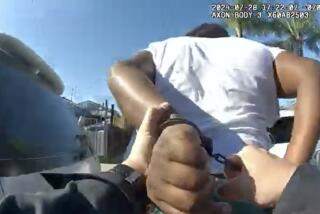Can a police officer order you out of your car? Experts weigh in on Sandra Bland case

Texas officials released this new version of the dash-cam video showing Sandra Bland’s arrest. It’s several minutes shorter than the original and appears to be glitch-free. Warning: Contains obscene language.
Can a police officer order you out of your car during a routine traffic stop as a Texas trooper did to Sandra Bland? And what about ordering you to put out a cigarette while you are still in your car?
Yes, an officer can order you out of your car, police experts agreed. But whether an officer can command you to extinguish a cigarette is murkier, depending on whether the cigarette is perceived as a threat. Several also said that some of the trooper’s actions were unprofessional and did not make for good policing.
Specifically, Texas Trooper Brian T. Encinia should not have reached into Bland’s vehicle when she refused his commands or threatened to “light” her up with a Taser, experts who saw the video said.
SIGN UP for the free Today’s Headlines newsletter >>
Three days after Bland’s July 10 arrest in Prairie View, Texas, she was found hanging from a plastic bag in her jail cell, officials said. A preliminary autopsy classified her death as a suicide, but this has been disputed by Bland’s family, who say she was a vibrant woman with a bright future.
Encinia has been placed on administrative leave for violating department procedures and Department of Public Safety courtesy policy, officials said. They have not elaborated on the violations.
The Times asked four nationally known police experts to review the video and comment on Encinia’s tactics.
Seth Stoughton, a University of South Carolina law professor and former Florida police officer, said Enicinia missed several opportunities to de-escalate tension and should have explained in calmer tones what he was doing and why.
“He certainly has the legal authority to get her to step out of the car,” Stoughton said. “But in this case, if he is exercising his authority because she defying his direction to put out the cigarette, then that is more based on his ego than public safety.... Just because it is legal to order her out of the car doesn’t make it a professional approach in modern policing.
“This is a systemic problem with policing,” Stoughton said. “There is emphasis on compliance over cooperation.”
There are no laws that require an officer to order alleged violators to extinguish a cigarette in their car during a traffic stop, he said.
“It was a request, not an order,” he said. “If a person was out of the car, then an officer could determine it poses a safety threat and order it be put out. But it is hard to argue that inside the car.”
The dash cam video released Tuesday by Texas authorities captured the beginning of the confrontation between the two. Bland’s arrest takes place outside the camera range, but the audio continued.
At first, Encinia approaches Bland’s vehicle and takes her license and registration before returning to the police cruiser. The officer returns to the driver’s side and asks Bland to put out her cigarette. She refuses.
Encinia shouts at her to obey his orders and to get out of the car. He reaches through the open driver’s-side door after Bland refuses to comply and pulls out a Taser. “Get out of the car,” he said. “I will light you up. Get out. Now. Get out of the car.”
After a few moments, Encinia steps back and Bland gets out of the car. The exchange grows more animated and hostile.
“You’re about to break my wrist,” Bland is heard to say. At one point, she shouts, “You’re a real man now!”
Throughout, Bland is questioning why she is being arrested and often shouts expletives. Encinia responds in angry tones that she should obey his orders.
Ed Obayashi, a sheriff’s deputy in Northern California and attorney who advises several sheriff’s departments, said the initial stop and interaction comply with case law dealing with police powers to detain a person. But, he said, events take a negative turn after Encinia comments to Bland that she seems irritated because she was pulled over and then asked her to put out her cigarette.
“The officer here acts very appropriately up until the time he says can you put out that cigarette and she asks why she cannot smoke in her car,” Obayashi said. “He then says, ‘I need you to step out of your car.’ Under Supreme Court doctrine he has the right to tell her to step out of the car. But then, as she refuses and he struggles to get her out of the vehicle, he threatens her with a Taser.
“When he says ‘I am going to light you up,’ things go south,” Obayashi said. “He is pointing a Taser and the verbal discourse is on. What follows is the perfect storm.”
After Bland steps out of the vehicle, the trooper orders her to the side of the road.
Obayashi said the trooper keeps relative control as he informs her that she is being arrested for resisting orders. As the pair move out of the camera’s vision, a struggle can be heard.
Bland repeatedly uses expletives and complains, “You are about to break my wrists.” She complains about her head and says she suffers from epilepsy. Encinia replies, “Good.”
Obayashi said officers legally don’t have to explain why they want you to get out of a vehicle. Given Bland’s belligerence and behavior, Encinia could have perceived her as representing a potential danger.
The trooper later wrote in an affidavit that Bland kicked him, leading to his use of force in which he took her to the ground.
“People don’t appreciate the danger of escalating a situation with law enforcement,” said Charles “Sid” Heal, a former L.A. County sheriff’s commander and force expert. “If a person believes they have a case, wait until after jail and sue. You don’t want to escalate the situation to the point the officer feels threatened.”
Heal said the roadside confrontation is all too common.
“As far as what I saw on the video I wouldn’t say that it was outside of standards nationwide,” he said. In terms of courtesy, Heal said, “raising your voice to a suspect is lowest level of force.”
Heal said when Bland refused to get out of the car the situation became more difficult. But reaching into a vehicle is often a mistake and makes an officer vulnerable. Heal said the officer should have handcuffed her immediately upon her getting out instead of waiting until they got off the road.
“If she kicked him as he says when they were out of the car, then at that point some kind of force is necessary,” Heal said.
Retired Los Angeles Police Capt. Greg Meyer said Bland’s behavior led to the result.
“Officers have complete discretion to control the movements of the violator, including making them get out the car,” he said.
Meyer said it is standard practice to have someone put out their cigarette.
“No one, including a police officer, wants to get a burning cigarette jammed into their face or eye; it’s basic procedure,” he said. “The officer asked politely if she would mind putting out her cigarette. The violator then raised her voice, actively resisted multiple lawful directions to get out of the car. The officer requested a backup officer to respond. The officer raised his voice several times in what turned out to be a futile effort to overcome that resistance.”
In hindsight, Meyer said, it may have been better to wait for backup. “The lady seemed committed to her resistance to lawful detention and arrest, so the presence of a backup unit might not have made much difference,” he said.
“This is yet another case of someone who chooses to illegally resist the directions of a police officer, thus escalating the situation, “ he said.
ALSO:
Sandra Bland’s arrest video: What it shows
Police find 5 dead in Oklahoma; 2 teens are taken into custody
James Holmes deserves to die, prosecutors tell jury as penalty phase begins
More to Read
Sign up for Essential California
The most important California stories and recommendations in your inbox every morning.
You may occasionally receive promotional content from the Los Angeles Times.











